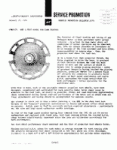89 40 hp Rude, electric start, remote control. Brief history, boat and motor fully winterized and garage stored for 1 1/2 years due to work travel and kitchen remodel project. In Aug. of this past season I rolled her out and woke her up. Drained and flushed fuel tank, new fuel, fuel filter, plugs, freshly charged battery, etc. Fired right up in driveway on muffs. Great so far. Changed plugs again after fogging oil burned out and headed to the boat launch. Engine fired right up and idled fine thru the 15 minute no wake zone to open water. When I opened the throttle, she ran up to about 3000 rpm for a few seconds and dropped back to no more than than 2000 rpm. It acted like it was starving for fuel, but pumping the fuel bulb did not help. I idled back to the launch with no problem, it ran fine under 1500 rpm. I rechecked the entire fuel system and took her out the next weekend and had the same problem. Thinking I had a fuel delivery problem, I replaced the VRO pump (ouch $$) to no avail. At this point, I realized I had not heard the warning horn test beep when I turned the key on. Testing the horn by connecting it directly to the battery proved it was shot, rusted beyond belief. I replaced it with a Radio Shack buzzer and then had constant horn on whenever the key was "on". Therefor the engine thought it was overheated and was in SLOW mode. I obtained an OEM manual and started troubleshooting. Temp switch checks OK, open to ground, with tan lead disconnected still constant horn. Tan lead to ignition module disconnected, constant horn. Tan lead fron VRO disconnected, constant horn. Grey lead from VRO, constant horn. Black lead from VRO discinnected, constant horn. Purple lead from VRO disconnected, constant horn. Oil tank sending unit disconnected, NO HORN! The oil tank connects to a tan wire that is tied to the tan VRO lead at the blocking diode and the tan wire that goes to the horn. I checked the oil sending unit lead, and it reads open to ground. I'm really perplexed at this point. The oil unit should cause a short beep every 20 seconds if the tank is less than 1/4 full. It is over !/2. Also, when the oil sending unit is disconnected, I still do not get the short test beep when I turn the key on.
Sorry to be so long winded, but I wanted to give as much info as possible.
Sorry to be so long winded, but I wanted to give as much info as possible.




















